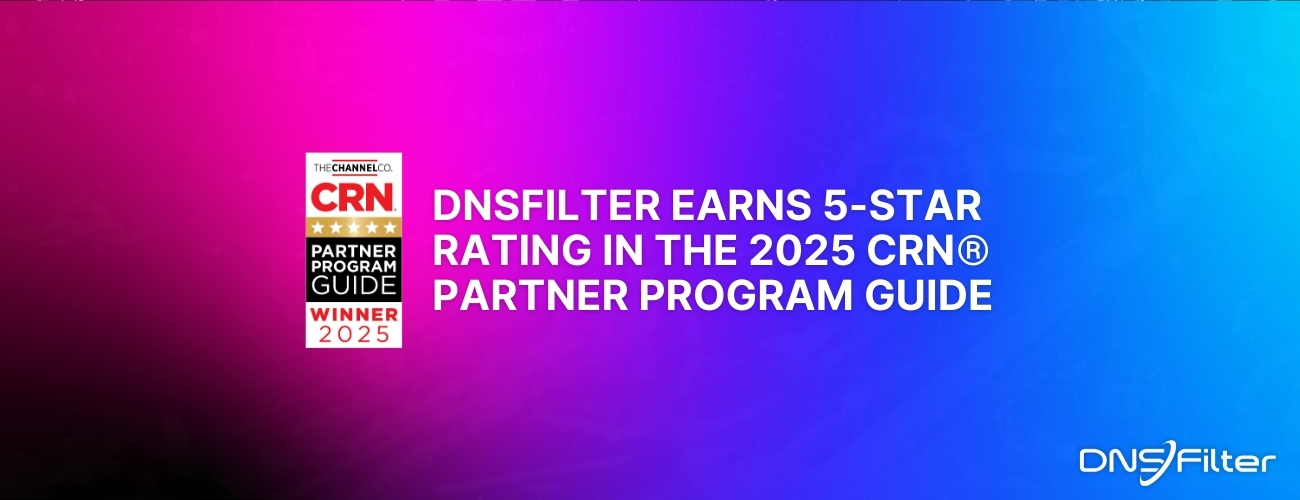Share this
DNSFilter Enhances Protective DNS Solution to Thwart New Threats
by DNSFilter Team on Dec 14, 2023 6:12:17 PM
WASHINGTON, Dec. 14, 2023 — DNSFilter today announced the addition of a new Malicious Domain Protection feature to its protective DNS software, building on its machine learning capabilities. This feature bolsters DNSFilter's enterprise-grade defenses providing better visibility and protection against Domain Generation Algorithms used in malware, botnet and other malicious domains, in addition to other threat vectors. This expands the company's threat detection capabilities and its ability to block large lists of undesirable domains and the security threats they pose.
Enterprise security teams that manage and secure both modern and legacy infrastructure struggle to protect end users from all categories of web-based threats. DNSFilter scans every domain its customers access to identify zero-day threats and prevent access before they infiltrate the network. Malicious Domain Protection leverages new ML capabilities to assist in the identification of risky domain strings, which includes domain generation algorithms (DGA) and other threat vectors. DGAs are used in malware to generate up to 250,000 domain names each day for use as rendezvous points with their C&C servers.
Malicious Domain Protection can identify more threats, including phishing, cryptojacking, botnet, ransomware and other spam domains, and catch them sooner. In the testing phase, Malicious Domain Protection identified more than 7,000 risky domains not yet identified by any other feeds. Threats were identified up to 10 days ahead of other third-party feeds with one domain being caught 59 days ahead.
David Elkind, chief data scientist, DNSFilter, said: "We are constantly working to offer better awareness and remediation of threat vectors. DNSFilter has a powerful data collection engine, supplemented by third-party feeds and we are always innovating new ways to use this data to protect our customers. We intend to take full advantage of all this data to protect our customers. With this new addition, our customers have even more safeguards."
About the company:
DNSFilter is redefining how organizations secure their largest threat vector: the Internet itself. DNSFilter is making the internet safer and workplaces more productive. In 2022 the threat protection leader blocked 9.1 billion threats, more than any other threat detection software globally. With 70% of attacks involving the Domain Name System (DNS) layer, DNSFilter provides protective DNS powered by machine learning that uniquely identifies 61% more threats than competitors on an average of seven days earlier, including zero-day attacks.
Over 26 million monthly users trust DNSFilter to protect them from phishing, malware, and advanced cyber threats. DNSFilter's brands include Webshrinker, its next generation web categorization software, and Guardian, a consumer app focused on privacy protection.
Share this
Categories
 DNSFilter Expands Capabilities with Strategic Acquisition of Zorus
DNSFilter Expands Capabilities with Strategic Acquisition of Zorus
Delivering Improved End User Protection, Increased Resiliency, and a Deeper Commitment to MSP Partners
 DNSFilter Helps MSP Drive Stronger Security Outcomes in the Education Space
DNSFilter Helps MSP Drive Stronger Security Outcomes in the Education Space
Long-time DNSFilter customer sees content filtering as foundational to security offering
 DNSFilter Earns 5-Star Rating in the 2025 CRN® Partner Program Guide
DNSFilter Earns 5-Star Rating in the 2025 CRN® Partner Program Guide
DNSFilterEarns 5-Star Rating in the 2025 CRN® Partner Program Guide


